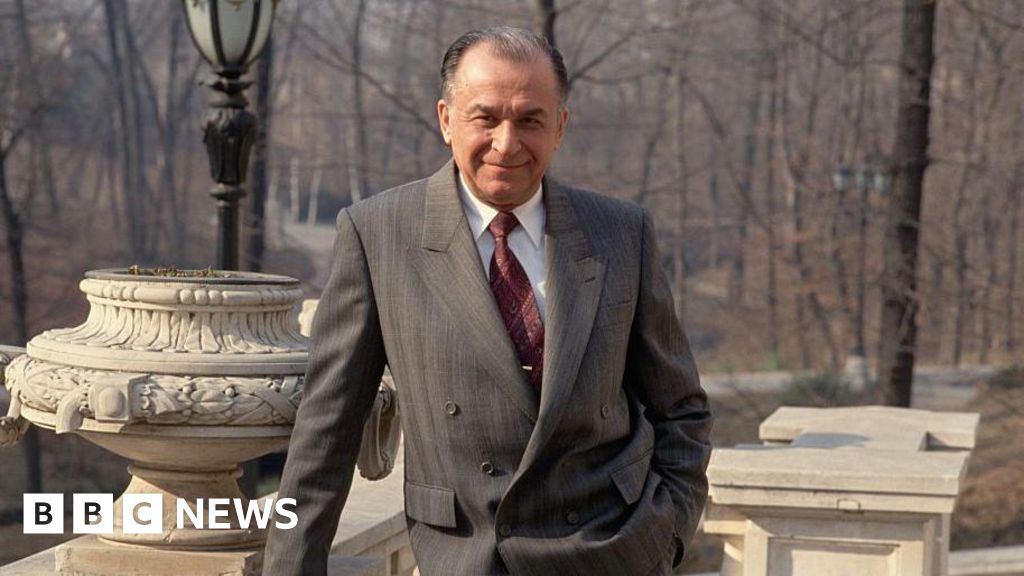生成中...【新闻趣读】罗马尼亚"民主教父"离世:左手北约入场券,右手矿工镇压令!93岁的扬·伊利埃斯库走了,这位带领国家走出齐奥塞斯库时代的首任民选总统,给罗马尼亚留下了分裂的遗产——有人赞他是"转型舵手",有人骂他是"披着民主外衣的前共产党人"。最戏剧性的是,这位莫斯科毕业的工程师,一边把罗马尼亚送进欧盟,一边又召唤矿工血洗抗议学生,堪称东欧版"我狠起来连自己人都打"!(友情提示:评价历史人物请自带辩证眼镜)
---
Ion Iliescu: Romania's first democratic leader with a divisive legacy
扬·伊利埃斯库:留下分裂遗产的罗马尼亚首任民主领导人
7 hours ago Share Save Mircea Barbu BBC News in Bucharest Share Save
7小时前 分享 保存 BBC布加勒斯特记者米尔恰·巴布 分享 保存
Peter Turnley/Corbis/VCG via Getty Images Iliescu at Romania's presidential palace in 1993, during his first of three terms in office
彼得·特恩利/考比斯/VCG通过盖蒂图片社 1993年伊利埃斯库在总统府,这是他三届任期中的第一届
Ion Iliescu, a figure whose name is intertwined with the tumultuous birth of modern Romania, has died at the age of 95. A career politician who shaped the country's transition from communism to democracy, he was both a beacon of hope and a deeply divisive presence in Romanian politics. His death on 5 August marks the end of a life spent at the heart of some of Romania's most dramatic and contentious moments."To understand Iliescu, you must grasp the complexity of Romania's 1990s," says political analyst Teodor Tita."He was neither a simple hero, nor a straightforward villain. He embodied the contradictions of a country struggling to reinvent itself while haunted by its past." Iliescu rose to prominence amid the chaos of the December 1989 revolution, when decades of Nicolae Ceausescu's oppressive rule came to an abrupt and violent end. Initially hailed as the man who would lead Romania into a new democratic era, Iliescu's legacy soon became more complicated.
与现代罗马尼亚动荡诞生紧密相连的扬·伊利埃斯库去世,享年95岁。这位主导国家从共产主义向民主转型的职业政治家,既是希望的灯塔,也是罗马尼亚政坛极富争议的人物。他8月5日的去世,标志着一段贯穿罗马尼亚最戏剧性争议时刻的人生落幕。"理解伊利埃斯库必须把握1990年代罗马尼亚的复杂性,"政治分析师特奥多尔·蒂塔说,"他既非单纯英雄,也不是简单反派,而是体现了一个被过去纠缠又奋力重塑的国家的矛盾。"伊利埃斯库在1989年12月推翻齐奥塞斯库政权的革命中崭露头角,最初被赞誉为民主新时代的引领者,但其政治遗产很快变得复杂。
His leadership steered the nation through its fragile early years of democracy and towards eventual integration with Nato and the European Union, achievements that many credit to his steady hand. Yet, as Teodor Tita explains:"His presidency was also marked by moments that still scar Romania's collective memory - the suppression of protests in 1990, the violent Mineriads, and his apparent reluctance to fully break with the old communist structures. These events have left a shadow that lingers."
在他的领导下,罗马尼亚度过了民主初期的脆弱阶段,最终加入北约和欧盟,许多人将此归功于他的稳健。但正如蒂塔所言:"他的总统任期也充斥着罗马尼亚集体记忆的伤痕——1990年镇压抗议、暴力矿工事件,以及明显不愿彻底脱离旧共产主义结构的倾向,这些阴影至今挥之不去。"
Georges Merillon/Gamma-Rapho via Getty Images Iliescu addresses thousands of people during his campaign in May 1990
乔治·梅里永/Gamma-Rapho通过盖蒂图片社 1990年5月竞选期间伊利埃斯库向数千人发表讲话
Born on 3 March 1930 in the Danube town of Oltenita, Iliescu studied engineering in Moscow, Russia, during the Stalin era, where he became active in Romanian student political circles. His time in the Soviet Union would later fuel speculation – never proven – that he had ties with high-ranking communist figures, including Mikhail Gorbachev. After returning to Romania, Iliescu rose rapidly within the Communist Party, holding positions in propaganda and youth policy. But his reformist leanings eventually made him a target for Ceausescu, who marginalised him from the party's upper ranks. By the 1980s, Iliescu was out of politics and working as a director at a government-affiliated academic publishing house. His re-emergence during the 1989 revolution, which lasted from 16-25 December and saw more than 1,000 people killed, was seen by some as opportunistic, but to others, it was a stabilising presence amid chaos. As leader of the National Salvation Front (FSN), a political organisation that formed during the revolution, Iliescu became Romania's interim president and oversaw the rapid dismantling of Ceausescu's regime. On Christmas Day, Nicolae Ceausescu and his wife were executed by firing squad after a trial at a military base that lasted two hours.
1930年3月3日出生于多瑙河畔奥尔特尼察镇的伊利埃斯库,在斯大林时代的莫斯科学习工程学,并活跃于罗马尼亚学生政治圈。这段经历后来引发他与戈尔巴乔夫等共产党高官有联系的猜测(从未证实)。回国后他在共产党内迅速晋升,主管宣传和青年工作,但改革倾向最终遭齐奥塞斯库排挤。1980年代退出政坛,在官方学术出版社任职。1989年12月16-25日的革命期间(导致千余人死亡)重新出山,作为革命中成立的救国阵线领袖成为临时总统,迅速瓦解齐奥塞斯库政权。圣诞节当天,齐奥塞斯库夫妇在军事基地受审两小时后被枪决。
Watch: The fall of the Ceaușescus - when Romania stood up to tyranny
观看:齐奥塞斯库夫妇倒台——罗马尼亚反抗暴政的时刻
In 1990, he won Romania's first democratic election in more than 50 years with a staggering 85% of the vote. But the campaign was marred by disinformation and state-aligned propaganda against liberal rivals. Later that year, Iliescu faced growing protests from students and opposition supporters. His now-infamous call for miners to descend on the capital to"restore order" led to days of brutal street violence known as the Mineriads, during which dozens were injured and several killed. He served another full term after winning the 1992 elections, then returned for a final presidency between 2000 and 2004. Turbulent years followed the revolution. Deep-rooted and insidious influential figures, dating back to the communist era persisted, and Iliescu's presidency was marked by widespread corruption. Critics argue that his reluctance to fully reform the justice system or confront the legacy of the Securitate – the feared secret police – allowed a culture of impunity to take root. More than three decades on from the revolution, Romania still struggles with political corruption and remains one of the poorest and most corrupt members of the European Union – a reality that some trace back to Iliescu's rule. His later years in office saw progress on Romania's Western integration – including Nato membership and the closing of EU accession talks. There were also market reforms, allowing small businesses to open, and Romania adopted its first democratic constitution in 1991, which still shapes the country today. But Iliescu remained dogged by questions over his role in the bloodshed of the early 1990s.
1990年他以85%得票率赢得罗马尼亚50多年来首次民主选举,但竞选充斥着针对自由派对手的虚假宣传。同年面对学生抗议时,他召矿工进京"恢复秩序"导致持续数日的暴力事件(矿工事件),造成数十人伤亡。1992年连任后,又在2000-2004年再次执政。革命后的动荡岁月里,共产主义时代的势力持续存在,其任内腐败盛行。批评者指出他未能彻底改革司法系统或清算秘密警察遗产,导致有罪不罚文化扎根。三十多年后的今天,罗马尼亚仍是欧盟最穷、最腐败成员国之一,有人认为这要追溯至他的统治。后期执政中,他推动罗马尼亚加入北约和欧盟,实行市场经济改革,1991年通过沿用至今的民主宪法。但1990年代初的血腥事件始终是其政治生涯的阴影。

